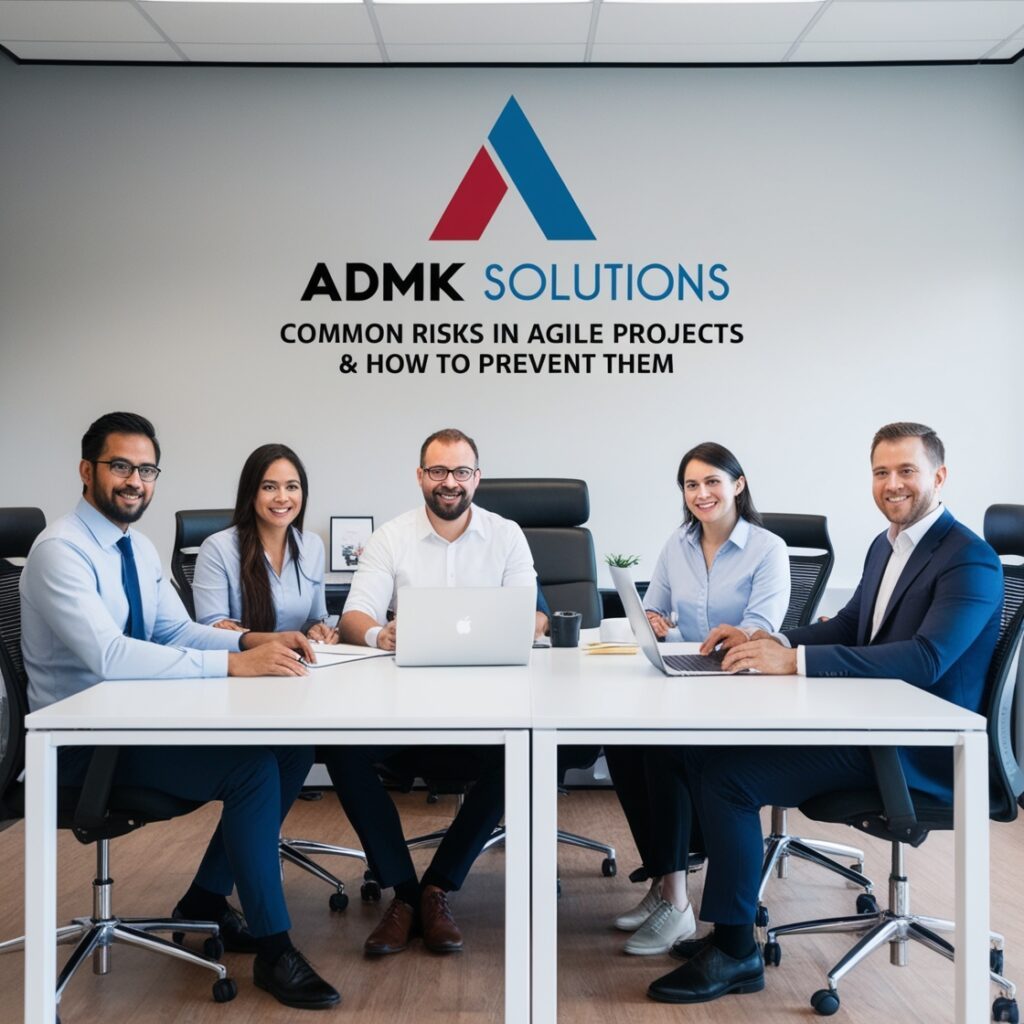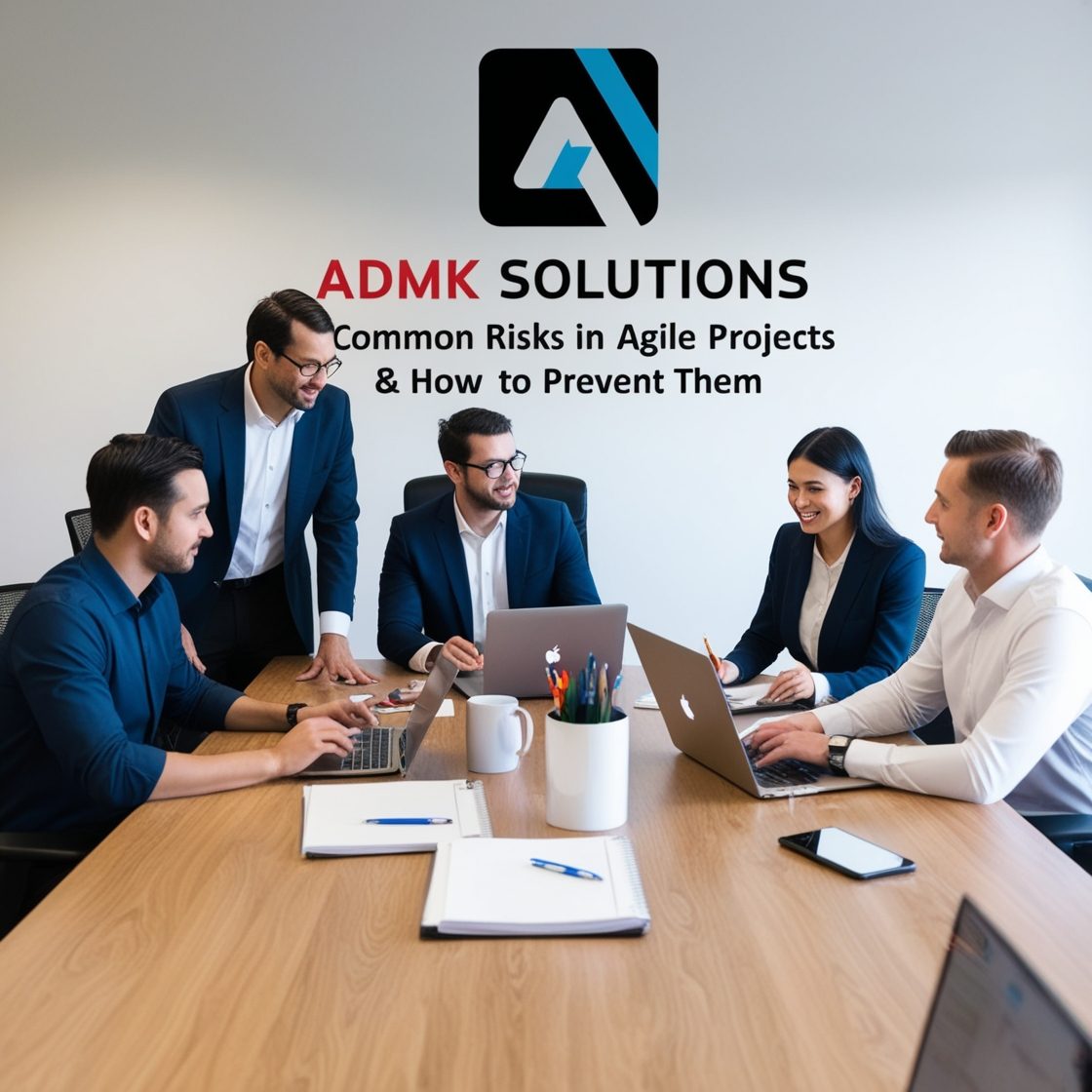Agile project management has become a standard in the software development industry, offering flexibility, improved product quality, and faster time-to-market. However, like any other methodology, Agile projects are not devoid of risks. Identifying these risks and implementing strategies to mitigate them is crucial for the success of any Agile initiative. ADMK Solutions, with its vast experience in digital marketing, UI/UX design, website development, mobile app development, eCommerce store services, and SEO marketing, provides valuable insights and solutions to prevent these common risks. This blog explores some of the most prevalent risks in Agile projects and how ADMK Solutions can help mitigate them.
Misalignment with Business Goals
One of the significant risks in Agile projects is the potential misalignment between the project’s deliverables and the overall business goals. Agile focuses on delivering small, incremental changes, which can sometimes lead teams to lose sight of the bigger picture. This misalignment can result in a product that, while functionally sound, does not meet the strategic objectives of the business.
ADMK Solutions emphasizes the importance of continuous alignment with business goals throughout the project lifecycle. By conducting regular review meetings and involving stakeholders in the decision-making process, ADMK Solutions ensures that the project remains on track to meet the business’s strategic objectives. This practice not only aligns the project deliverables with business goals but also fosters a sense of ownership and accountability among all team members.
Inadequate Stakeholder Engagement

Stakeholder engagement is crucial for the success of any project, but it can be particularly challenging in Agile projects where the requirements are constantly evolving. Inadequate stakeholder engagement can lead to misunderstandings, missed requirements, and ultimately, a product that does not meet user needs.
ADMK Solutions addresses this risk by fostering a culture of transparency and continuous communication. They ensure that stakeholders are actively involved in the project through regular updates, demo sessions, and feedback loops. This engagement helps in capturing the evolving requirements accurately and ensures that the final product aligns with stakeholder expectations. Additionally, ADMK Solutions leverages their expertise in UI/UX design to create prototypes and mockups, facilitating better visualization and understanding of the end product for stakeholders.
Insufficient Team Collaboration
Agile projects thrive on collaboration and teamwork. However, insufficient collaboration can lead to siloed work, reduced productivity, and ultimately, project failure. The absence of effective communication channels and collaboration tools can exacerbate this risk.
ADMK Solutions mitigates this risk by promoting a collaborative work environment and utilizing advanced collaboration tools. They encourage cross-functional teams to work closely, share knowledge, and support each other. Regular stand-up meetings, retrospectives, and collaborative workshops are integral parts of their Agile process. By using state-of-the-art collaboration tools, such as project management software and communication platforms, ADMK Solutions ensures that all team members are on the same page and working towards a common goal.
Scope Creep
Scope creep is a common risk in Agile projects due to the iterative nature of the methodology, which encourages frequent changes and additions. While flexibility is a hallmark of Agile, uncontrolled scope creep can lead to missed deadlines, budget overruns, and project burnout.
ADMK Solutions tackles scope creep by implementing robust change management practices. They prioritize and manage changes through a well-defined process, ensuring that only the most critical and valuable changes are incorporated into the project. By using techniques such as MoSCoW prioritization (Must have, Should have, Could have, and Won’t have), ADMK Solutions helps teams make informed decisions about which features to include in each iteration. Regular backlog grooming sessions and sprint planning meetings further ensure that the project scope remains controlled and manageable.
Technical Debt
Technical debt refers to the shortcuts and compromises made in code quality to expedite delivery. While it may provide short-term gains, technical debt can accumulate over time, leading to increased maintenance costs, reduced code quality, and slower development velocity.
ADMK Solutions addresses technical debt by promoting best practices in software development. They emphasize the importance of clean code, automated testing, and regular code reviews. By integrating continuous integration and continuous deployment (CI/CD) pipelines, ADMK Solutions ensures that code quality is maintained throughout the development process. This proactive approach to managing technical debt helps in delivering high-quality products that are easier to maintain and scale.
Inadequate Testing
In Agile projects, the emphasis on rapid delivery can sometimes lead to inadequate testing, resulting in bugs and defects that impact the product’s quality. Inadequate testing not only affects the user experience but also increases the cost and effort required for fixing issues post-release.
ADMK Solutions places a strong emphasis on comprehensive testing practices. They integrate testing into every stage of the development process, from unit testing and integration testing to user acceptance testing. By adopting test-driven development (TDD) and behavior-driven development (BDD) methodologies, ADMK Solutions ensures that tests are written before the code, leading to more robust and defect-free software. Automated testing frameworks are also employed to accelerate the testing process and ensure consistent quality across different iterations.
Lack of Skilled Resources
Agile projects require a team of skilled professionals who are proficient in various aspects of software development, including coding, testing, UI/UX design, and project management. A lack of skilled resources can hamper the project’s progress and quality.
ADMK Solutions addresses this risk by building a team of highly skilled and experienced professionals. They invest in continuous training and development programs to keep their team updated with the latest industry trends and technologies. By fostering a culture of learning and growth, ADMK Solutions ensures that their team is well-equipped to handle the challenges of Agile projects. Additionally, they leverage their extensive network to quickly onboard specialized resources when required, ensuring that the project does not suffer due to resource constraints.
Unrealistic Expectations
Unrealistic expectations from stakeholders and management can put immense pressure on Agile teams, leading to burnout and reduced productivity. These expectations often stem from a lack of understanding of Agile principles and the iterative nature of the methodology.
ADMK Solutions mitigates this risk by setting realistic expectations from the outset. They educate stakeholders about the Agile process, emphasizing the importance of iterative development and incremental delivery. By providing clear and transparent communication regarding project timelines, milestones, and potential risks, ADMK Solutions helps in managing expectations effectively. Regular status updates and progress reports further ensure that stakeholders are well-informed and have a realistic understanding of the project’s progress.
Inconsistent Velocity
Velocity, a measure of the amount of work a team can complete in a given iteration, is a critical metric in Agile projects. Inconsistent velocity can disrupt planning and forecasting, leading to missed deadlines and project delays.
ADMK Solutions ensures consistent velocity by implementing effective sprint planning and estimation practices. They use historical data and team capacity to make accurate estimates and plan sprints accordingly. By conducting regular retrospectives, ADMK Solutions identifies and addresses any issues affecting the team’s velocity, such as bottlenecks or resource constraints. This continuous improvement approach helps in maintaining a steady and predictable velocity, ensuring that the project progresses smoothly.
Poor Documentation
In Agile projects, the focus on working software over comprehensive documentation can sometimes lead to inadequate documentation. Poor documentation can pose challenges for future maintenance, onboarding new team members, and knowledge transfer.
ADMK Solutions strikes a balance between working software and adequate documentation. They ensure that critical aspects of the project, such as architecture, design decisions, and key functionalities, are well-documented. By using tools like wikis and collaborative documentation platforms, ADMK Solutions makes it easy for team members to create, update, and access documentation. This approach ensures that essential information is captured and available for future reference, without compromising the agility and speed of development.
Resistance to Change
Agile projects often require significant changes in the way teams work and collaborate. Resistance to change from team members or stakeholders can hinder the adoption of Agile practices and affect the project’s success.
ADMK Solutions addresses this risk by fostering a culture of openness and adaptability. They involve all team members in the transition process, providing training and support to help them understand and embrace Agile principles. By creating an environment where feedback is encouraged and valued, ADMK Solutions ensures that everyone feels heard and supported during the change process. This inclusive approach helps in overcoming resistance and promotes a smooth transition to Agile methodologies.
Ineffective Retrospectives
Retrospectives are a vital part of Agile projects, providing an opportunity for teams to reflect on their performance and identify areas for improvement. However, ineffective retrospectives can lead to superficial discussions and missed opportunities for growth.
ADMK Solutions conducts thorough and structured retrospectives to ensure meaningful outcomes. They use various techniques, such as the “Start, Stop, Continue” method and the “5 Whys” analysis, to facilitate in-depth discussions and identify root causes of issues. By creating a safe and open environment for sharing feedback, ADMK Solutions ensures that retrospectives are productive and lead to actionable improvements. This continuous improvement mindset helps in enhancing the team’s performance and the overall success of the project.
Contact Us:
Conclusion
Agile project management offers numerous benefits, but it also comes with its own set of risks. Identifying these risks and implementing effective mitigation strategies is crucial for the success of any Agile project. ADMK Solutions, with its extensive experience in digital marketing, UI/UX design, website development, mobile app development, eCommerce store services, and SEO marketing, provides valuable insights and solutions to prevent these common risks. By fostering continuous alignment with business goals, promoting stakeholder engagement, encouraging team collaboration, managing scope creep, addressing technical debt, ensuring comprehensive testing, building a skilled team, setting realistic expectations, maintaining consistent velocity, balancing documentation, overcoming resistance to change, and conducting effective retrospectives, ADMK Solutions helps in mitigating the risks and ensuring the success of Agile projects
